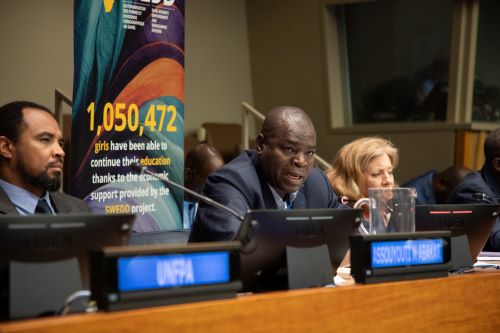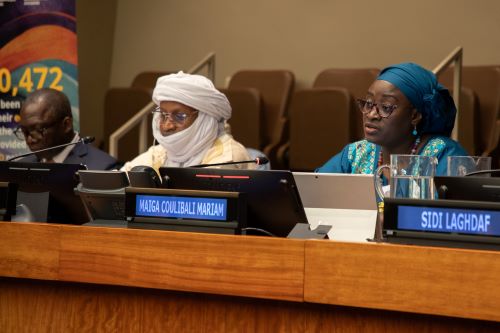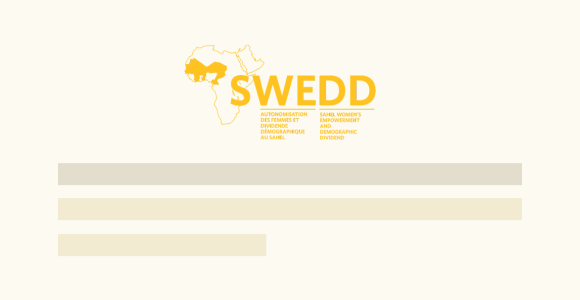

NEWS
High-Level Panel Spotlights the importance of SWEDD's National Demographic Dividend Observatories for African development
24 May 2024

1st May 2024, NEW YORK - Chad, Mali, Mauritania, and Niger highlighted the crucial role of their National Demographic Dividend Observatories (NDDOs) during a high-level session at the 57th Commission on Population and Development. They showcased evidence of improved school retention rates for girls, increased use of family planning, and averted teenage pregnancies amongst other life changing results, in their countries. This session was organized by UNFPA West and Central Africa regional office.
African leaders grasp the need to address challenges posed by a fast-growing population, projected to reach nearly 3 billion by 2060 from today's 1.4 billion. To leverage this growth and enhance gender equality, they adopted the African Union's roadmap, "Harnessing the Demographic Dividend through Investments in Youth," in Addis Ababa in 2017, to expedite Agenda 2063 and the ICPD plan of action.
VIDEO National Demographic Dividend Observatories: Turbocharging development in SWEDD countries
The SWEDD project has effectively implemented this AU recommendation by establishing and operating National Demographic Dividend Observatories (NDDOs) in nine countries: Benin, Burkina Faso, Chad, Cote d'Ivoire, Guinea, Mali, Mauritania, Niger and Senegal.
Held in New York on May 1st, the event was chaired by UNFPA Deputy Executive Director (Programme) Diene Keita, who lauded the SWEDD project for implementing key African Union recommendations on NDDOs. She commended the collaboration between the World Bank and UNFPA, expressing gratitude to ministerial delegations from Mali, Mauritania, Niger, and Chad for sharing project progress.
Panellists included Ms. Carolyn Shelton, Acting Practice Manager of the Western and Central Africa Region for the Health, Nutrition, and Population (HNP) Global Practice of the World Bank who reiterated the bank's commitment to vulnerability and human development priorities. She emphasized the importance of data availability through national observatories and praised the collaboration between the World Bank and UNFPA in implementing key African Union recommendations.
Ms. Binta Diop, Special Envoy of the Chairperson of the African Union Commission on Women, Peace, and Security, lauded the achievements reported during the event, stressing their importance in aligning with the AU roadmap on the demographic dividend. She also highlighted the necessity of adapting to disruptive factors like climate change and security crises to consolidate and intensify results.

Officials from Mali, Chad, Niger and Mauritania shared notable accomplishments from their respective countries, emphasizing advancements in areas such as healthcare, education, and economic empowerment.
Mr Imirane Abdoulaye Touré, Mali's Minister of Town Planning, Housing, Land Management and Population, highlighted key results in Mali, including the training and recruitment of 100 midwives deployed in rural areas, the economic empowerment of women through loans and subsidies or vocational training for thousands of young girls and women, and a 97% school retention rate for girls thanks to school support programmes.
In Chad, Mr Assouyouti Mahamat Abakar, Minister of the Economy, Development Planning, and International Cooperation said 6,000 religious leaders were trained to support social and economic change based on religious and cultural norms. The country has also registered more than 300,000 new users of family planning methods. Furthermore, school support provided to more than 125,000 girls has led to a school retention rate of 98% and a Baccalaureate pass rate of 75%. Credits have also been granted to 380 women’s groups.

The Permanent Representative of Mauritania to the United Nations, Sidi Mohamed Laghdaf added that a great deal of evidence had been produced by NDDOs to support development such as National Transfer Accounts or budgeting sensitive to the demographic dividend.
He added that in Mauritania SWEDD had increased the number of midwives and strategies for retaining midwives in rural areas and provided educational and economic support for thousands of beneficiaries, and support for the development of life skills for thousands of girls.
Life changing successes have also been remarkable in Niger where the school retention rate has reached 88% according to the Permanent Representative of Niger to the United Nations, Yaou Sangaré Bakary. There has been an increase in the enrolment of girls who have dropped out of school, a reduction in the stock out of family planning product from 17% to 2% and an increased use of family planning products through community-based distribution.
Dr. Coulibaly Mariam MAIGA, Mali's Minister for the Promotion of Women, Children, and the Family, delved into the SWEDD project's impact on addressing gender-based violence and harmful practices. She outlined initiatives for gender mainstreaming and the establishment of specialized centers for women's needs, along with the enactment of legislation promoting gender equality.
The session also underlined the strides made towards achieving the goals set forth by the International Conference on Population and Development (ICPD) 30, which include promoting reproductive health and rights, ensuring universal access to sexual and reproductive health services, and advancing gender equality and women's empowerment. By showcasing progress in these areas, the event demonstrated the commitment of SWEDD countries to realizing the objectives of the ICPD agenda.

